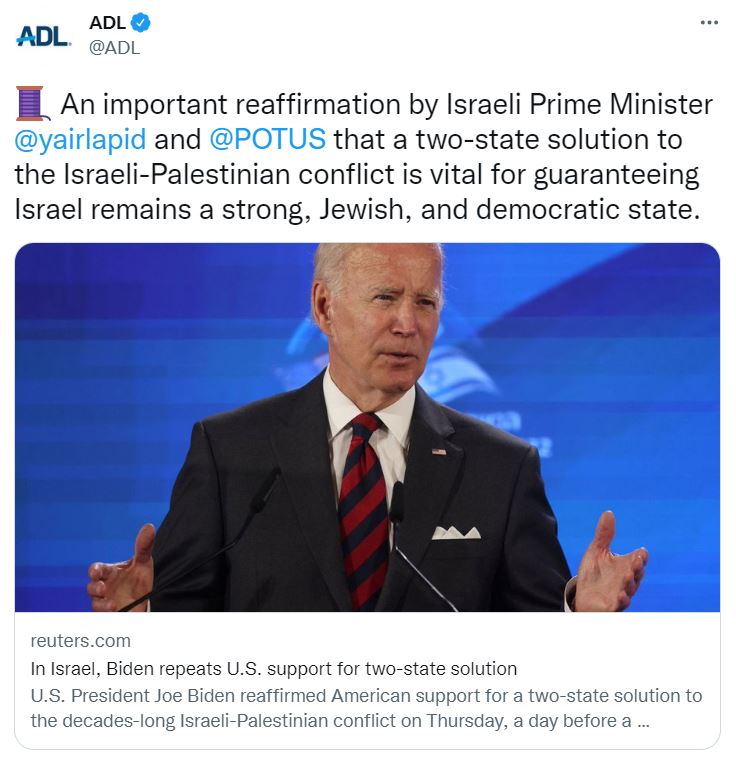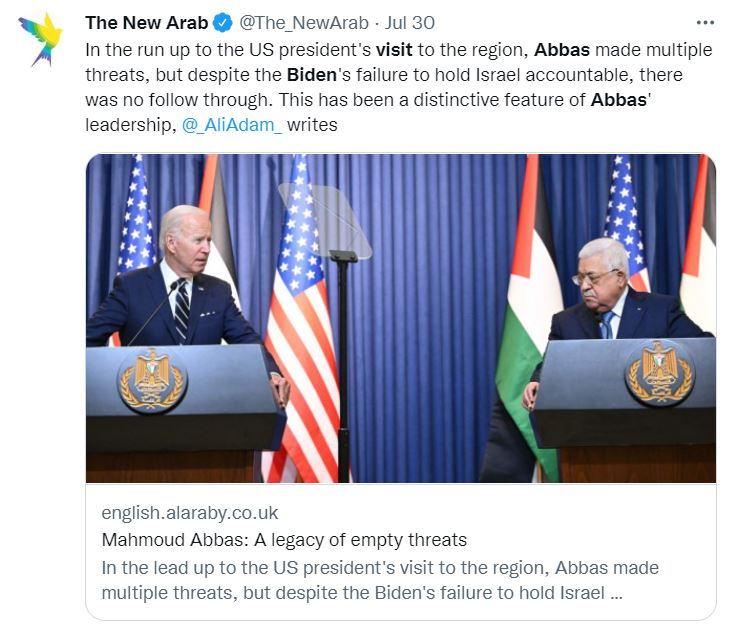Dear Friends,
US President Joe Biden successfully navigated precarious political sensitivities on his visit to the region this month, declaring his support for a two-state solution according to 1967 borders with a gentle touch that sought to avoid antagonizing Israel's right-wing during a crucial pre-election window for interim PM Yair Lapid. Biden's statement in Bethlehem managed to keep alive hope that the administration will be more active on Israeli-Palestinian issues after November's elections in Israel and the US, as the PA and other regional players make clear they are expecting concrete progress on the diplomatic front.
The Two State Index falls -0.2% in July to 5.63. Click on the headlines below for in-depth analysis on how developments this month impacted the feasibility of the two-state solution.
|
|
|
|
To learn about the Geneva Initiative's TSI, visit our website.
|
|
|
|
Lip-Service or Not: Biden Visit Accomplished Maximum Possible Under Limiting Political Circumstances
On the surface, US President Joe Biden’s visit appeared to relegate the Israel-Palestinian conflict to the sidelines. But with a soft-glove approach that took into consideration the precarious political considerations of both his Israeli and Palestinian counterparts, Biden’s clear support for the two-state solution kept hope alive that the administration will be more active on the issue after November's mid-term elections.
The Biden administration had been cautious in defining the trip’s goal, centering it around Arab normalization and regional integration. Indeed, the timing is hardly ideal for any major advances in the peace process with PA President Mahmoud Abbas facing internal strife and growing support for Hamas, and Israeli PM Yair Lapid leading a transitional government in a rapidly-shifting pre-election atmosphere. And yet, for the first time in years, the leaders of the US, Israel, and the Palestinian Authority are all ideologically aligned in support of the two-state solution.
|
|
|
|

Both Biden and Lapid spoke of Palestinians’ right to live in “security, freedom and prosperity”, and both leaders reiterated their support for the two-state solution. In remarks delivered in Bethlehem alongside Abbas, Biden declared – for the first time as president – his commitment to a two-state solution according to 1967 borders with land swaps. His visit to East Jerusalem, without an official Israeli escort, was seen as a clear message to both sides that the Trump era is over.
“Expectations for Biden’s visit were not high. The hope was that the visit would at least signal that the Palestinian issue is still relevant, and that the US is still interested. There had been concern that Biden would not even make a clear statement to that effect,” says Nidal Foqaha, Director General of the Palestinian Peace Coalition (PPC). “At this time, their engagement with the issue is most important. But in time, it will not be sufficient.”
With little to no pushback on the Palestinian issue, critics quickly dismissed Biden’s visit as a missed opportunity to hold Israel accountable for damaging unilateral steps. But with the Bennett-Lapid coalition having demonstrated a real effort over the past year to contain settlement expansion and advance economic measures with the Palestinians, analysts say that a public rebuke would have accomplished little more than antagonizing and emboldening Israel’s right-wing camp during a crucial window for Lapid to demonstrate his leadership ahead of elections.
|
|
|
|

“The absolute minimum Biden can do—not to advance the peace process but just to be seen as minimally serious about his support for two states—is to try to undo the damage done by the previous administration. This includes reversing Trump’s policies on settlements and following through on his promise to reopen the US consulate in Jerusalem,” says Khaled Elgindy, Sr. Fellow at the Middle East Institute.
The TSI’s International Actors (US) parameter remains unchanged at 7 this month, with Biden’s visit marking important engagement on the two-state solution but accomplishing little in terms of tangible policy. The public impression that Biden’s visit relegated the Palestinian issue more or less to a “non-issue” leads to a drop in both the Palestinian Public Opinion and Israeli Public Opinion from 5 to 4. At the same time, with the visit generating an increasing amount of discussion about the two-state solution, the Palestinian Public Discourse and Israeli Public Discourse parameters rise to 5 and 6 respectively
|
|
|
|
In Reality Check to US and Israel, Saudi Arabia Conditions Ties on Two-State Solution
Saudi officials poured cold water on hyperbolic statements about warming ties between Saudi Arabia and Israel, reiterating Riyadh’s position that a two-state solution to the Israel-Palestinian conflict is a “requirement” for formalizing relations between the countries. The Saudi position was somewhat of a reprieve for the Palestinians, who were concerned that more dramatic gestures would be advanced at the expense of the Palestinian cause.
Indeed, the strongest pushback on Palestinian issues during all of Biden’s Middle East tour came in Saudi Arabia, where in addition to snubbing the Abraham Accords and conditioning relations with Israel on the two-state solution, Saudi Crown Prince Mohammed bin Salman also confronted Biden over the killing of veteran Palestinian-American journalist Shireen Abu Akleh.
|
|
|
|
With Lapid-Abbas Phone Call, Eyes on UNGA as Possible Forum for In-Person Encounter
Little over a month after taking office, Israeli PM Yair Lapid spoke by phone with PA President Mahmoud Abbas in the first direct call between an Israeli premier and the Palestinian leader in five years. The phone conversation was part of a round of calls made by Lapid to Muslim leaders on the occasion of Eid al-Adha.
The call by no means signified a significant step towards a political process, but the rare engagement between the Israeli and Palestinian leaders could set the stage for a possible future Lapid-Abbas encounter, with analysts pegging a regional gathering in Cairo or Amman or the UN General Assembly in New York in September as a potential forum for such a meeting.
|
|
|
|
Lapid himself has said that he would not rule out a meeting with Abbas, but stipulated that is unlikely to occur over the next four months. Nonetheless, Lapid appears to be preparing the Israeli public consciousness for such a step – speaking on multiple occasions this month of his support for the two-state solution and continuing a policy of high-level engagement with the Palestinians, without committing to any major political or diplomatic steps.
"Even small gestures, like a holiday phone call, are important in the current climate. Lapid and Gantz are trying to build evidence of a partnership with the Palestinians. When Israelis don’t see or hear about routine engagement then fear grows. Regular dealings with the PA help slowly turn them back into a partner,” says Shalev.
Defense Minister Benny Gantz met Abbas in Ramallah this month, marking his third tete-a-tete with the Palestinian leader over the past year. As with the past two meetings, this one was followed with the announcement of a number of new measures.
|
|
|
|
Despite these steps, analysts do not expect a genuine Israeli peace initiative in the foreseeable future due to current domestic political realities: “Israel is strong and comfortable enough that it can afford to ignore the Palestinian issue more or less indefinitely. Lapid or any Israeli PM is unlikely to engage in a meaningful peace process unless it is compelled to do so by the international community, and especially the United States," says Khaled Elgindy, Sr. Fellow at the Middle East Institute.
“It’s hard to judge Lapid while he leads a transitional government. We hear and follow what Lapid is saying, but do not see it as sufficient. Engagement with the Palestinians needs a more visible commitment towards the cause,” says Nidal Foqaha, Director General of the Palestinian Peace Coalition (PPC).
The TSI’s Israeli Prime Minister parameter remains unchanged this month at 6. The Integrity of Palestinian Governance (Economic Stability) parameter meanwhile rises from 4 to 5.
|
|
|
|
After Temporary Delay For Biden Visit, Israel Resumes Settlement Expansions, Home Demolitions, and West Bank Raids
|
|
|
|
- Israel Strikes Gaza After Rocket, Gunfire Following Biden Visit: Israel carried out strikes in the Gaza Strip this month in response to rocket and gun fire from the enclave following Biden’s visit. The strikes came as Israel acknowledged, for the first time, its use of attack drones – which Israel has long been accused of deploying against targets in Gaza.
- Rivals Abbas, Haniyeh Meet in Algeria: The long-estranged leaders of Hamas and Fatah held their first face-to-face meeting in several years, while PA President Mahmoud Abbas and Hamas chief Ismail Haniyeh were both in Algeria to mark the country’s 60th Independence Day. Neither leader’s office released details of their conversation, which Hamas described as “brotherly”. Palestinian analysts have dismissed suggestions that the meeting signaled serious new efforts to broker reconciliation talks between the warring factions.
|
|
|
|
The Two-State Index (TSI) is brought to you by the Geneva Initiative, a Palestinian-Israeli organization working to promote a negotiated peace agreement in the spirit of the two-state vision. The TSI is produced by an Israeli-Palestinian team, and reflects a unique bilateral perspective.
|
|
|
|
Think we missed something this month? Send us tips and comments here.
|
|
|
|
|
|
|